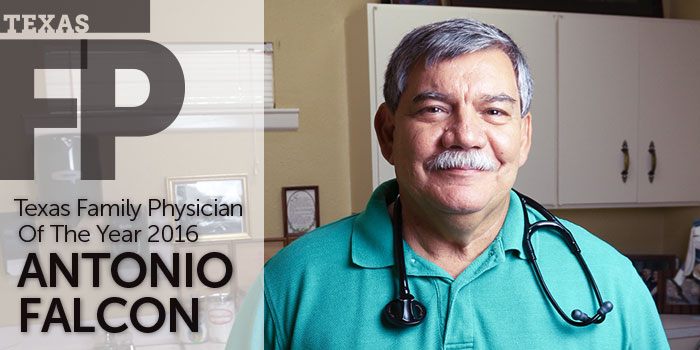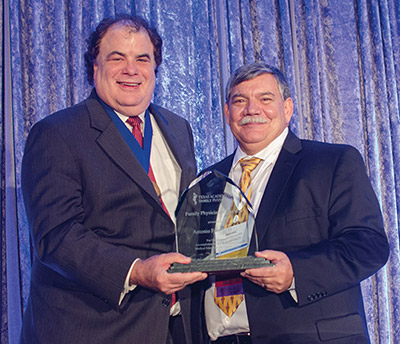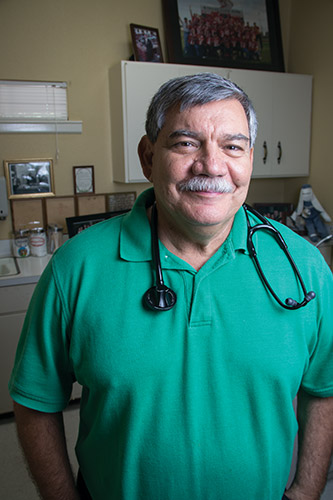The richest man in the world

The richest man in the world
Story and photos by Samantha White
It’s 6 a.m. on a typical Thursday at the Family Health Center in the small border town of Rio Grande City, Texas. Antonio Falcon, MD, pulls into the clinic’s parking lot to see a handful of early morning patients already waiting for him. He enters the building through his office’s side door to avoid the waiting room. While he loves his patients and they will all get his full attention in the exam room, he knows if he walks through that room this early in the morning when it is full of people, his day will never begin.
Falcon greets his medical assistants, taking a few moments to catch up with their personal lives or the latest local news stories. He sets his things down and settles in, preparing for the 20 or so appointments and seemingly endless line of walk-in patients he’ll see. The clinic will have to stop taking walk-ins within the next hour or he’ll have more patients than he is able to see. On this day he will end up seeing 37 or 38 patients over the next six hours in the clinic—a pretty typical day for Falcon and the Family Health Center.
Family medicine isn’t just about filling prescriptions and conducting well visits, though family docs spend a lot of time on both. It’s not just delivering babies and diagnosing the common cold, though both happen frequently. It’s more than geriatrics and pediatrics, and it’s more than caring for multiple generations of one family.
“I think the most important thing is not to forget patients have feelings,” Falcon says. He knows family medicine is so much more than the actual medicine itself.
“Being sensitive to their needs is probably the most critical thing. I don’t think patients ever expect you to have everything right, but I think they expect you to listen.”
Listening to patients and showing them you care is just as vital as prescribing medications, Falcon explains. Touching them, greeting them with a hug or a quick peck on the cheek, smiling—all simple acts of kindness that can go a long way in the exam room he says.
“I’m one of those who feels that touching a patient is very important. Especially the older individuals. Sometimes nobody ever gives them a hug or tells them they look nice or they smell nice. Sometimes when you’re in that age group of your 70s and 80s, sometimes people forget that you need strokes of kindness, and the family doctor can do that. One act of kindness in the examining room can be worth a ton of medications.”
“I try to compliment my patients as much as possible. Sometimes the little grandmothers that are 90 are never told that their blue hair is cute. It’s okay to do that and they love it! It’s an easy thing to do. It costs you absolutely nothing.”
Other lines of work might frown upon getting to know your patients personally, but Falcon thinks it makes family doctors even better physicians.
“Never giving up hope for the patient is another thing. You can get involved and emotional with your patients. You can hurt when they hurt. I think when you do that they feel closer to you. They have a greater tendency to follow your advice. They’ll listen to your words and if you give encouraging words and words of comfort, you’ve done 99 percent of what a good family doctor will do.”
“I went to the poorest county in the country and became the richest man. I say that because I am absolutely blessed with richness from my family.” – Antonio Falcon, MD
Falcon, the 2015-2016 Texas Family Physician of the Year, was born in Edinburg and raised in Rio Grande City, where he continues to practice today. He only left his hometown for long enough to attend school and complete his residency.
A long line of Falcon’s family members attended the University of Texas at Austin for their undergraduate education, and Falcon had plans to do the same. It was just after Vietnam though, and his educator father felt there would be too many distractions in Austin. Falcon instead attended Baylor for his undergraduate degree, Baylor College of Medicine in Houston for his medical degree, then he completed a family medicine residency back in Waco. After his father passed away in 1972, Falcon became the father figure to his three younger brothers.
While in Houston he met a nurse named Kathy, who relocated from Vermont after nursing school. The two married during his second year of residency. We he had completed his residency, the Falcons returned to Rio Grande City in 1980 and he began practicing.
He became a father that same year when Kathy gave birth to their only son, James. Over the next decade, four daughters followed: Sarah, Emily, Kelly, and Patty. Raising their five children is obviously the Falcons’ proudest achievement in life. All five are now successful in their respective careers: A brigade surgeon in the U.S. Army, a family physician, a speech pathologist, an attorney, and realtor.
Though his office’s physical location and practice type has changed a few times over the last three and a half decades, he never saw himself leaving his hometown to practice anywhere else.
“I saw the need here,” Falcon says. “I grew up here and saw that the area was desperate for more practitioners. When I came to Starr County it was labeled the poorest county in the country.”
In his acceptance speech at TAFP’s Annual Session and Primary Care Summit, he talked about moving back home to the poverty-stricken Rio Grande Valley to not only practice family medicine, but to raise a family.

Falcon receives the 2015-2016 Texas Family Physician of the Year Award from TAFP Immediate Past President Dale Ragle, MD.
“I went to the poorest county in the country and became the richest man,” Falcon said. “I say that because I am absolutely blessed with richness from my family.”
Falcon went on to humbly thank his peers for nominating him for the award and give medical students and residents in the audience some tips on being a family physician.
“Don’t forget that it’s not about the money. It’s about what happens in your heart. It’s about the relationship with your patients.”
Just like many other family physicians across the country, “family doc” isn’t Falcon’s only job title. Falcon served as the local high school’s team physician for multiple decades and served for nine years on the school board. He is an active preceptor in the Texas Statewide Family Medicine Preceptorship Program. He is a clinical assistant professor for the University of Texas Medical Branch Department of Family Medicine. He served as the emergency medical services director for Starr County Memorial Hospital for many years. He is active in the Hidalgo-Starr County Medical Society and once served as president of the TAFP Valley Chapter. He spent many years on the Texas Medical Association’s Foundation Board and TMA’s Political Action Committee.
Falcon is not only a humble, small town physician. He’s also a politically active heavy hitter with strong governmental ties. In 2003, Governor Rick Perry appointed Falcon as co-chair to the Proposition 12 campaign, a tort reform that fought to protect physicians from lawsuits by capping malpractice suit payouts. In 2007, Falcon was appointed by President Bush to the United States-Mexico Border Health Commission where he collaborated with other states and both countries’ federal governments to give recommendations to the Secretary of Health and Human Services on border health. More recently, Gov. Perry once again appointed Falcon, this time to the state’s Health and Human Services Council, a duty he is currently fulfilling.
One of Falcon’s favorite professional accomplishments is having served on the Texas Parks and Wildlife Commission for seven years. Whereas the Health and Human Services Council is strictly advisory, the parks commission was given direction from the legislative branch and actually put laws into place. He says seeing how the government works from the inside broadened his outlook on the state of Texas and that he was honored to serve a bigger community in all of these capacities.
“To be in a leadership position where you can make changes, rules, regulations, that affect the everyday life of an individual, is critical. There’s nobody in better positions in small communities than family docs to do that.”
Falcon also stresses the importance of rural physicians specifically being active members of the political landscape to fight for their communities.
“Sometimes the family docs are the only people who are going to advocate for patients out in rural areas. The only ones who are really going to understand out in rural areas are the rural practitioners because they live in town. I think it’s absolutely critical that family docs continue to participate and be a voice in state government. It’s important to be heard, to be loud when you have to be loud, and to not be afraid to say what you think.”
Rural medicine has its ups and downs for sure Falcon says, but it is also the only type of medicine he can imagine himself doing.
“There are difficulties in rural medicine. You really have to love it. On the other hand, it’s super rewarding to be involved with the community and to know the community.”
Over the years Falcon saw more and more patients unable to make the drive to McAllen to meet with specialists. They couldn’t afford the gas, couldn’t take the time off work, or didn’t have a car, among other reasons. The sensible solution was to bring the specialists to town, so that’s what he did. On his suggestion, multiple specialists set aside a half day outside of their clinics to travel the 40 miles from McAllen to Rio Grande City and see patients. It started with nephrologists, then expanded to cardiologists, optometrists, and pediatricians. There are also now two dialysis centers, an additional nursing home, and a permanent MRI in the area, all of which Falcon had a strong hand in.
It’s this type of concern for and action to better the community that makes Falcon a local leader. Audencio Garza has lived next to the Falcons for over 15 years now and says relating to his patients culturally allows Falcon to be the best possible physician.
“If you’re born here, raised here, you know the conditions, you know the people,” Garza says. “The better doctor would be somebody who is locally grown because he or she would know what’s needed for the community.”
Having only left for a handful of years, Falcon was already active in the South Texas community when he returned to practice medicine. Many people were already familiar with him, or at least with the Falcon name. The Falcon family has been in the Rio Grande Valley for multiple generations and many Falcons hold notable positions in the area. His brothers alone, now all retired, were the county’s emergency coordinator, a longtime teacher, and a border patrol officer. Everyone in the community knows the Falcon name one way or another.
Another homegrown local physician, Jake Margo, Jr., MD, is active in TAFP, currently serving as the organization’s vice president and the Valley Chapter’s president. Margo echoes Falcon’s sentiments on the importance of docs being active community members.
“It’s not enough to be a physician,” Margo says. “You’re looked up to in the community. You are expected to be involved. Your opinion matters, not just when it comes to medical issues, but local politics, schools.”

Falcon at the Family Health Center in Rio Grande City, Texas.
Seeing a homegrown resident become a family doc like Falcon inspires younger residents. Stella Winters, a third-year resident at the John Peter Smith Family Residency Program, grew up in Rio Grande City and is currently rotating there. She credits Falcon with supporting her pursuit of education to become a physician, by mentoring her as she volunteered at the hospital and financially helping her attend a pre-med conference, both while she was still in high school.
“He’s been very inspirational to the young people, the next generation,” Winters says. “He’s the role-model-type figure saying ‘this is possible, you can do this, somebody from here has done it.’ He’s been very supportive in developing potential for young people here in this small city.”
It’s difficult to find someone in Rio Grande City who doesn’t know and love Falcon. Margo first met Falcon as a kid when he sprained his ankle. He says Falcon has always been casual, making you feel relaxed and like you are part of the Falcon family. His youngest daughter, Patty, says that’s what makes him a good family doctor—his ability to make patients feel so comfortable they feel like a part of his family.
A patient and friend of Falcon, Ivo Perez, had a stroke in 2011 and now comes to the clinic to get his blood pressure checked twice a week, a service Falcon doesn’t charge him for despite its frequency. Perez is grateful to have Falcon as a friend and physician.
“Like they say, you only have friends when you’re in jail, when somebody passes away, and when you’re in the hospital,” Perez says. After the stroke Perez suffered, he says Falcon came to the hospital and checked on him often. “To me he’s a good friend.”
“All his care is patient-oriented and often includes the entire family for the betterment of the patient,” Margo says. “This often includes seeing several family members at once for their convenience. How else could he instill such loyalty in his patients that they would often rather go back home than be seen by someone else in the clinic?”
Rosa Garza has been a medical assistant with Falcon for 11 years. When she was hired she only planned on staying for a year or two before finding another career. She says Falcon is the reason she has stayed in the profession for so long. “I love working with Dr. Falcon so much it’s like, why leave?”
“He’s very down to earth,” Garza says, “and patients can actually talk to him. When I go to the doctor I feel intimidated and scared, but Dr. Falcon is so down to earth. You just feel so much…he’s not even a doctor. He’s just your friend.”
His willingness to listen to patients is a gift from God, Falcon’s brother Gene says.
“So many of his patients always tell me, ‘after I saw Dr. Falcon I feel so much better.’ I ask them if he gave them medicine. ‘No, we just talked,’ they say. ‘After I left, I felt great!’”
Nanette Garcia, another family friend, says Falcon has a way of making you feel good even at your worst times. He helped Garcia through her mother’s stroke and death in 2015, visiting her McAllen nursing home weekly. He’s a people person, she says.
“To be in a leadership position where you can make changes, rules, regulations, that affect the everyday life of an individual, is critical. There’s nobody in better positions in small communities than family docs to do that.” – Antonio Falcon, MD
“People tend to gravitate toward him. He knows how to make everybody feel comfortable. I don’t think it’s something he does on purpose, it’s just part of his personality.”
Long-time patient Yolanda doesn’t know what she will do if Falcon ever retires. They grew up together, working in the melon sheds as kids, and she can’t imagine anyone else as her health care provider.
“He has helped me a lot when I couldn’t afford it. I didn’t have insurance or anything, but it didn’t matter to him. He looks after his patients. He knows you, and he hears you.”
It’s now Thursday evening and after spending his afternoon working on paperwork and fielding calls from people asking for medical advice, Falcon is enjoying a dinner out with his wife. They discuss the events of the day and what’s to come in the next few weeks—a visit with his friends from his undergrad days at Baylor, a daughter’s wedding in Austin, and the upcoming birth of their sixth granddaughter. The satisfaction in Falcon’s smile when discussing these family milestones says it all. In this moment, Falcon is the richest man in the world.